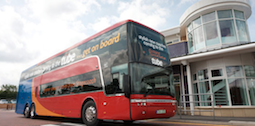National Express Group Plc announced on Tuesday it is in talks to buy Perth-based Stagecoach in an all-share deal that would value the Scottish transport firm at about £445 million.
Stagecoach founders Brian Souter and his sister Ann Gloag announced in April a 10-year plan to reduce their shareholdings in the firm from 27% to 5% — a move that some analysts viewed as paving the way for a takeover.
Stagecoach’s biggest institutional shareholder is listed as Threadneedle Asset Management with about 18%.
On news of the talks, Stagecoach shares rose about 21% to give it a stock market value of about £455 million, while National Express shares were up about 8%.
The UK bus industry is poised for consolidation as it emerges from the Covid-19 pandemic and needs to slash costs and invest heavily in zero emission buses.
National Express has until October 19 to announce a firm intention to make an offer for Stagecoach or walk away.
The firms said there is no certainty that any offer will be made.
Under the terms of the potential combination, it is expected that Stagecoach shareholders would receive 0.36 new National Express ordinary shares for each Stagecoach ordinary share, resulting in them owning approximately 25% of the combined group.
Stagecoach chair Ray O’Toole — a former chief operating officer at National Express — would become chair of the combined group, with National Express Group CEO Ignacio Garat becoming CEO of the merged firm and National Express Group CFO Chris Davies becoming CFO of the combined group.
National Express Group said a combined group could realise “significant pre-tax cost synergies delivering attractive value” for both sets of shareholders.
“National Express has, to date, identified pre-tax cost synergies that are expected to reach a run-rate of at least £35 million, with approximately 25% achieved by the end of the first year, 85% by the end of the second year and full run rate by the end of the third year following completion of the potential combination,” said National Express.
The boards of National Express and Stagecoach said they “believe that the potential combination would be a strategically compelling proposition with significant growth and cost synergies, as well as delivering strong value creation for both sets of shareholders.”
National Express said a merger would deliver “significant operational efficiencies across the combined networks, with, for example, National Express Coach utilising Stagecoach’s well-located depot network to run and maintain its coach operations …”
It said that across National Express’ broader international portfolio, the merger would also “yield increased scale and financial flexibility to facilitate continued investment in an attractive and diversified pipeline of high-return growth opportunities in North America and ALSA.”
AJ Bell investment director Russ Mould said: “It’s pitched as a merger, but it is clear which party will be in control.
“National Express is trying to buy Stagecoach, plain and simple.
“The benefits of parking the two businesses together include operating synergies, economies of scale and a bigger footprint for National Express in growth areas such as private coach hire and corporate transport.
“The starting gun on Stagecoach being a bona fide takeover target was fired in April when founders Sir Brian Souter and his sister Dame Ann Gloag sold just over 2% of the business.
“This was part of a plan to reduce the family ownership from 27.1% to 5% over the coming decade.
“In doing so, they have removed a major hurdle for any would-be suitor by declaring their intention to sell down the bulk of their holding.
“While the pair still have a significant stake, their willingness to start selling down should make it easier for National Express to convince them to accept its all-share offer.
“The competition authorities might have something to say about the two public transport operators coming together, but otherwise the deal looks fairly sensible.
“The fact that Stagecoach’s board have called it a ‘strategically compelling proposition’ would also suggest talks are friendly.
“A key factor to consider is whether someone else might fancy owning Stagecoach, such as an overseas transport operator.
“It is not an easy feat to build up a large position in the UK public transport market and Stagecoach now has 8,400 buses and coaches
“There may be some nervousness around using public transport at present due to the lingering pandemic, but long term it seems inevitable that buses will remain a vital part of the UK’s transport network.
“Stagecoach has a key position in various parts of the country including places like Manchester where companies continue to expand, thereby pushing up employment and with it demand for commuter services.”
